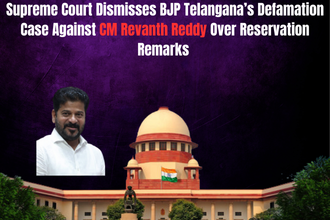On June 12, 2025, tragedy struck when Air India Flight AI171 crashed, killing 260 people including passengers, crew, and individuals on the ground. The devastating accident has raised serious concerns over India’s aviation safety standards and the transparency of official investigations. Now, a Public Interest Litigation (PIL) filed in the Supreme Court of India has called for an independent, court-monitored probe into the incident, alleging bias and suppression of crucial information in the preliminary investigation.
The Petition Filed in Supreme Court
The PIL was filed by Safety Matters Foundation, an aviation safety NGO led by Capt. Amit Singh FRAeS, under Article 32 of the Constitution of India. The petition argues that the preliminary probe into the Air India crash violates fundamental rights guaranteed under Articles 14, 19(1)(a), and 21:
- Article 14 (Right to Equality): The petitioner alleges that a selective and arbitrary investigation undermines equal protection of the law.
- Article 19(1)(a) (Right to Information and Expression): Withholding factual flight data suppresses the public’s right to truthful information.
- Article 21 (Right to Life): A flawed investigation into a disaster of such magnitude compromises citizens’ right to life, safety, and dignity.
Allegations Against the Preliminary Report
On July 12, 2025, the Aircraft Accident Investigation Bureau (AAIB) released its Preliminary Report, attributing the crash to “fuel cutoff switches” being moved from RUN to CUTOFF—pointing to possible pilot error.
However, the Safety Matters Foundation strongly disputes this conclusion, claiming the report is incomplete and biased. The petition highlights:
- Withholding Crucial Data: The report does not disclose the complete Digital Flight Data Recorder (DFDR) output, the full Cockpit Voice Recorder (CVR) transcript with timestamps, and the Electronic Aircraft Fault Recording (EAFR) data. These records are essential for understanding the sequence of events leading to the crash.
- Downplaying System Failures: The report allegedly ignores documented anomalies such as:
- Fuel switch defects
- Electrical faults
- RAT (Ram Air Turbine) deployment
- Electrical disturbances
- Premature Blame on Pilots: By focusing on alleged pilot error, the investigation, according to the petition, violates Annex 13 of the Chicago Convention, which requires independent and prevention-focused investigations into aircraft accidents.
Conflict of Interest in the Investigating Team
The PIL also raises concerns about conflict of interest. The investigating team is reportedly dominated by officers of the Directorate General of Civil Aviation (DGCA), even though the DGCA’s regulatory oversight is itself under scrutiny.
This, the petitioner argues, creates a situation where the regulator accused of lapses is also part of the investigation—a clear conflict undermining the credibility of the probe. The petition stresses that such practices erode public trust in aviation safety and damage India’s standing before the International Civil Aviation Organization (ICAO).
What the Petition Seeks
The NGO has sought specific directions from the Supreme Court:
- Disclosure of All Flight Data: Immediate public release of DFDR, CVR, and fault message records relating to Air India Flight AI171.
- Independent Investigation: Appointment of a qualified, independent investigator of international standing to conduct the probe.
- Court-Monitored Inquiry: Ongoing supervision of the investigation by the Supreme Court to ensure transparency, impartiality, and compliance with ICAO standards.
The petition was filed through Advocate-on-Record Pranav Sachdeva.
Legal Issues Raised
The petition highlights important constitutional and legal concerns:
- Transparency vs. National Security: While aviation data is often considered sensitive, the right to truthful information in disasters must prevail under Article 19(1)(a).
- Accountability of Regulators: Can a regulator accused of oversight failure lead an investigation into the same incident?
- Judicial Intervention in Aviation Safety: The plea tests the scope of judicial oversight in technical, international-standard investigations.
International Aviation Standards
The Chicago Convention (Annex 13) governs global aircraft accident investigations. It emphasizes:
- Independence of the investigation authority.
- Focus on preventing future accidents, not assigning blame prematurely.
- Full disclosure of factual data to ensure accountability.
The petitioner argues that India’s preliminary report fails these standards, risking ICAO censure and harming the country’s aviation reputation.
Wider Implications for Aviation Safety in India
The PIL highlights systemic concerns beyond the Air India crash:
- Passenger Safety: If crash investigations are biased, systemic flaws remain unaddressed, risking future accidents.
- Regulatory Oversight: The DGCA’s role in both regulation and investigation may require restructuring for independence.
- Public Trust: Transparency in air crash investigations is vital for restoring passenger confidence in Indian airlines.
Similar Cases and Judicial Trends
India has previously witnessed judicial intervention in transport-related disasters:
- In MC Mehta v. Union of India (Oleum Gas Leak case, 1987), the Supreme Court expanded the scope of liability in industrial disasters.
- The Court has often invoked Article 21 to ensure safety standards in railways, road transport, and environmental hazards.
The current petition aligns with this tradition of using public interest litigation to secure accountability in matters involving mass casualties.
Case Details
- Case Title: Safety Matters Foundation v. Union of India & Ors.
- Diary No.: 53715 / 2025
Conclusion
The Air India Flight AI171 crash and the subsequent PIL raise serious questions about aviation safety, regulatory accountability, and the right to truthful information in India. By seeking a court-monitored independent probe, the petition underscores the need for transparency and systemic reform in how air crash investigations are conducted.
As the Supreme Court considers the matter, the outcome could shape the future of air safety governance in India. If the Court orders greater transparency and independence, it may restore public trust and align India with international best practices. On the other hand, a refusal to intervene could leave lingering doubts about the fairness of the probe and the safety of India’s skies.


